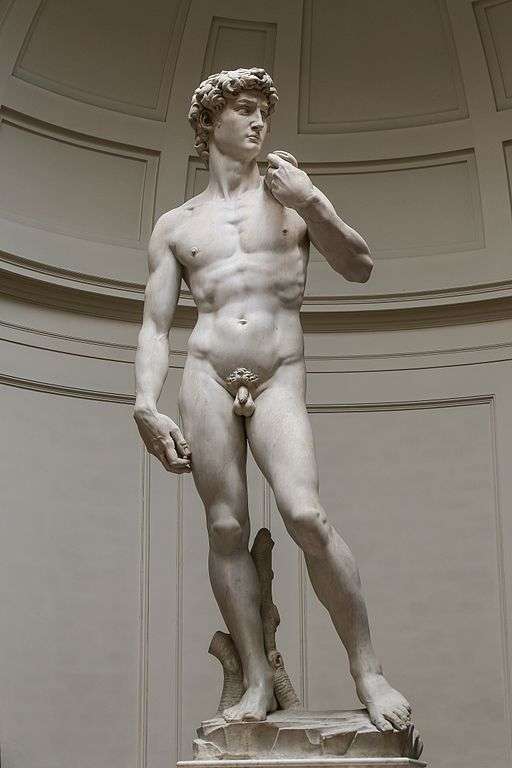The Volokh Conspiracy
Mostly law professors | Sometimes contrarian | Often libertarian | Always independent
Charter School Principal "Forced to Resign" Allegedly Because 6th-Grade Students Were Shown Michelangelo's David
[UPDATE: I've added excerpts from a Slate interview with the school's Board Chair, who ended up commenting on the story after all; his view is that the firing stemmed only from the failure to alert parents to the upcoming material.]

From Tallahassee Democrat (Ana Goñi-Lessan) (paywalled):
A local charter school principal said she was forced to resign after a parent complained a Renaissance art lesson was pornographic…. She believes the catalyst for the ultimatum was complaints about an art lesson on the Renaissance period….
[Board Chair Barney Bishop III], who confirmed he did give Carrasquilla that ultimatum, said he could not say why he asked her to resign because of the school's employment lawyer's advice….
Out of the three parents [who had complained], two said they wished they had been notified of the lesson beforehand, and the other parent complained the lesson was pornographic, Carrasquilla said.
A letter notifying parents of the art lesson should have been sent to parents, Carrasquilla said, but a breakdown in communication between the principal, the director of operations and the art teacher led to an administrative oversight, and parents were not informed.
The board passed a new rule last month that would require parental notification two weeks in advance of any curriculum that is taught that is "potentially controversial," Bishop said….
I don't think there's a First Amendment violation here, even if the facts are as alleged: Charter schools are apparently treated as public schools, so they are bound by the First Amendment, but individual K-12 teachers and principals don't have a First Amendment right to make curriculum decisions; legislatures, boards of educations, and the governing boards of schools can be the ones who decide what is taught.
Nonetheless, if the facts are as alleged, then this seems like a foolish decision. This is one of the great works of Western art—part of America's, and the world's, cultural patrimony—and possibly the most famous example of fine art sculpture (the Statue of Liberty and Mt. Rushmore might be rivals as to fame, especially in the U.S., but they belong to a somewhat different genre). It illustrates the power of sculpture to evoke a person or a story, even without color or motion.
It's not pornographic in the sense of being aimed at sexually arousing people, or being likely to cause such arousal. It seems to me to be an eminently proper subject for 6th graders (i.e., 11-to-12-year-olds) to view. Any sensible lesson on Renaissance art history has to show it, I think. And even to the extent that this is "potentially controversial" in a descriptive sense (it did seem to create controversy), and given that the principal had erred in failing to notify parents, the situation doesn't seem to be a basis for firing.
UPDATE: Despite Chair Bishop's statement to the Tallahassee Democrat that "he could not say why he asked [the principal] to resign because of the school's employment lawyer's advice," he gave an interview to Slate (Dan Kois):
As I said in the Tallahassee Democrat, based on counsel from our employment lawyer, I'm not going to get into the reasons. But this wasn't about that one issue. That's not the entire truth, and she knows it. The fact is, I have been working with her since she became principal, and I have supported her as principal. But as I saw how things were going, how decisions were being made, I made the decision this was the best thing for the school….
The teacher mentioned that this was a nonpornographic picture, No. 1. The teacher said, "Don't tell your parents," No. 2. So the issue, Dan, isn't whether children should see these pictures or not. Gosh, we're a classical school. Why wouldn't we show Renaissance art to children? …
Did parents know in advance what children were going to see and hear and learn? Dan, 98 percent of the parents didn't have a problem with it. But that doesn't matter, because we didn't follow a practice. We have a practice. Last year, the school sent out an advance notice about it. Parents should know: In class, students are going to see or hear or talk about this. This year, we didn't send out that notice….
This year, we made an egregious mistake. We didn't send that notice. Look, we're not a public school. We're a public charter. Parents, after they saw all the crap that's being taught in public schools during COVID, decided of their own that they didn't want their children to be taught that. Here we teach the Hillsdale Curriculum, focusing on civic and moral values. We teach a traditional, Western civilization, liberal classical education. And if there's controversial topics or subjects, we tell parents in advance. We're going to be sensitive to everybody at the school….
We don't have any problem showing David. You have to tell the parents ahead of time, and they can decide whether it is appropriate for their child to see it….
I'm certain the vast majority of parents have no problem with it. And again, no one has a problem with David. It's not about David….
Three parents objected. Two objected simply because they weren't told in advance. One objected because the teacher said nonpornography. Nonpornography—that's a red flag. And of course telling the students, "Don't tell your parents"—that's a huge red flag!
[Slate question:] Wait, so the objection was just that the teacher used the word pornography in a sixth grade classroom?
Yes, that word is inappropriate in that classroom. No. 1, no one said it was pornography. No. 2, it's not on the curriculum. No. 3, you don't need to be saying that word in a classroom in Florida!
Thanks to commenter TwelveInchPianist for the pointer to the interview.


Show Comments (95)